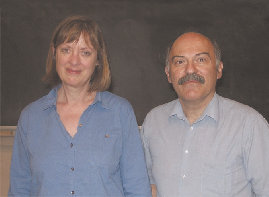Lori Havatian
Staff Writer

On Friday, October 24 the CineCulture campus and community film series featured Hrag Yedalian’s film, The People’s Advocate: The Life & Times of Charles R. Garry, an hour-long documentary about Charles R. Garry (Garabedian). Garry was one of the most influential criminal defense attorneys of the twentieth century, who became a household name during the 1960s with his defense of revolutionary political icons like Huey Newton and Bobby Seale of the Black Panther Party.
This year the CineCulture series became a regular class in the University curriculum, offered through the Department of Mass Communications and Journalism, and taught by Prof. Mary Husain. Community members join in watching the films and in the discussions.
Following the screening, Prof. Barlow Der Mugrdechian was the guest discussant for the film. Yedalian’s film was exciting and vibrant and gave the audience insight into Garry’s life. Garry was born into a very poor family. His mother and father settled in Massachusetts but later on made their way to the San Joaquin Valley to become peach farmers. As a child Garry was teased at school because he was Armenian, often fighting with those who taunted him. There were discriminatory housing and employment practices against Armenians during the time he was growing up.
Later Garry moved to San Francisco, eventually becoming a successful lawyer. He was labeled a communist for his opinionated views, a charge he vehemently denied. After earning his law degree, he came under the scrutiny of the House Un-American Activities Committee (HUAC). When he finally appeared before the Committee, Garry used references to his own Christian beliefs to defend himself.
Garry defended twenty-four murder cases during his career, winning them all.
An outspoken advocate for the underdog, Garry’s career came to an unexpected and tragic halt in 1978 when his client, the Rev. Jim Jones of the Peoples Temple, led over 900 of his followers to death at Jonestown. Garry was never the same and was diagnosed with Parkinson’s disease, suffered from memory loss, and had trouble sleeping. Garry died in 1991 but his legacy carries on.
Charles Garry was one of the finest lawyers on the streets of San Francisco and what made him “real” was not flashy suits, but the principled stands he took during his life.
 Hye Sharzhoom Armenian Action
Hye Sharzhoom Armenian Action